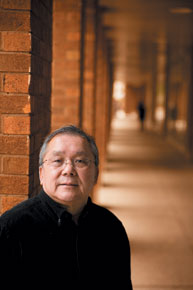Selling your soul
Conference looks at Faust in non-Christian cultures

Professor Adrian Hsia joined the McGill Department of German Studies in 1968.
Claudio Calligaris
If you've ever watched Little Shop of Horrors or hummed along to "The Devil Went Down to Georgia" then you've encountered Faust. Echoes of the tale of a German alchemist who sells his soul to the devil in exchange for power and knowledge abound in popular culture.
From October 4-7, McGill will host the first-ever International Conference on the Reception of Faust in Non-Christian Cultures. Adrian Hsia, professor of German and German literature, is organizing the event, which will bring together scholars from around the world who examine Faust from non-Christian perspectives.
"We know how Faust was perceived, adapted and performed in music and theatre in European countries," said Hsia. "But this conference is the first time that world reception is being studied." It will include interpretations of Faust from Islamic, Hindu and Buddhist points of view. Conference presenters will hail from Japan, Germany, Turkey, United Arab Emirates, India, Thailand, Korea and China, among others.
Hsia says the concept of powerful god versus powerful devil works for some non-Christian religions, such as Islam, in interpreting Faust because the contradiction between ultimate good and ultimate evil is similar in each monotheistic faith. "Beyond Islam, the whole situation is different. Hindus have many gods and in Buddhism you want to achieve nirvana so god is not as important."
Indian interpretation focuses on devas (deities). The conference will include the talk 'The Faustian as Mirrored in the Fight Between the Devas and the Asuras' (deities who were opposed to devas). "It has no central devil, no devil-king," says Hsia, "So they have to spread it to lesser devils."
East Asia also does not have a sole god nor a sole devil but Confucianism plays a role in the interpretation of Faust. "Confucius does not deny gods but says the focus should be on human beings, so it is a kind of self-perfection ideal. The East Asian ideal would be somebody who strives to perfect him or herself and therefore achieve good, and that is the part that is common in Japan, Korea and China."
Hsia himself will present a lecture on the Korean soap opera Dai Zang Kum, also known as Dae Jang Geum. This popular series features a young woman who was a physician under the Josean Dynasty in Korea in the early 1500s. His talk will use the female protagonist as a prototype of a female Faust. "Since the 19th century the female Faust in European literature was seen as negative because she interferes in the world of Man. She has been portrayed as a femme fatale seducing the man or as returning to the world of the kitchen." Hsia shows her as Faustian in terms of the striving and achievement-oriented traits of Faust.
The International Conference on the Reception of Faust in Non-Christian Cultures will be held at McGill October 4-7. The conference is sponsored by the Social Sciences and Humanities Council of Canada, the Faculty of Arts, the Department of German Studies, McGill University as well as the German Academic Exchange Service (DAAD). Organized by Adrian Hsia in collaboration with the International Goethe Society.

